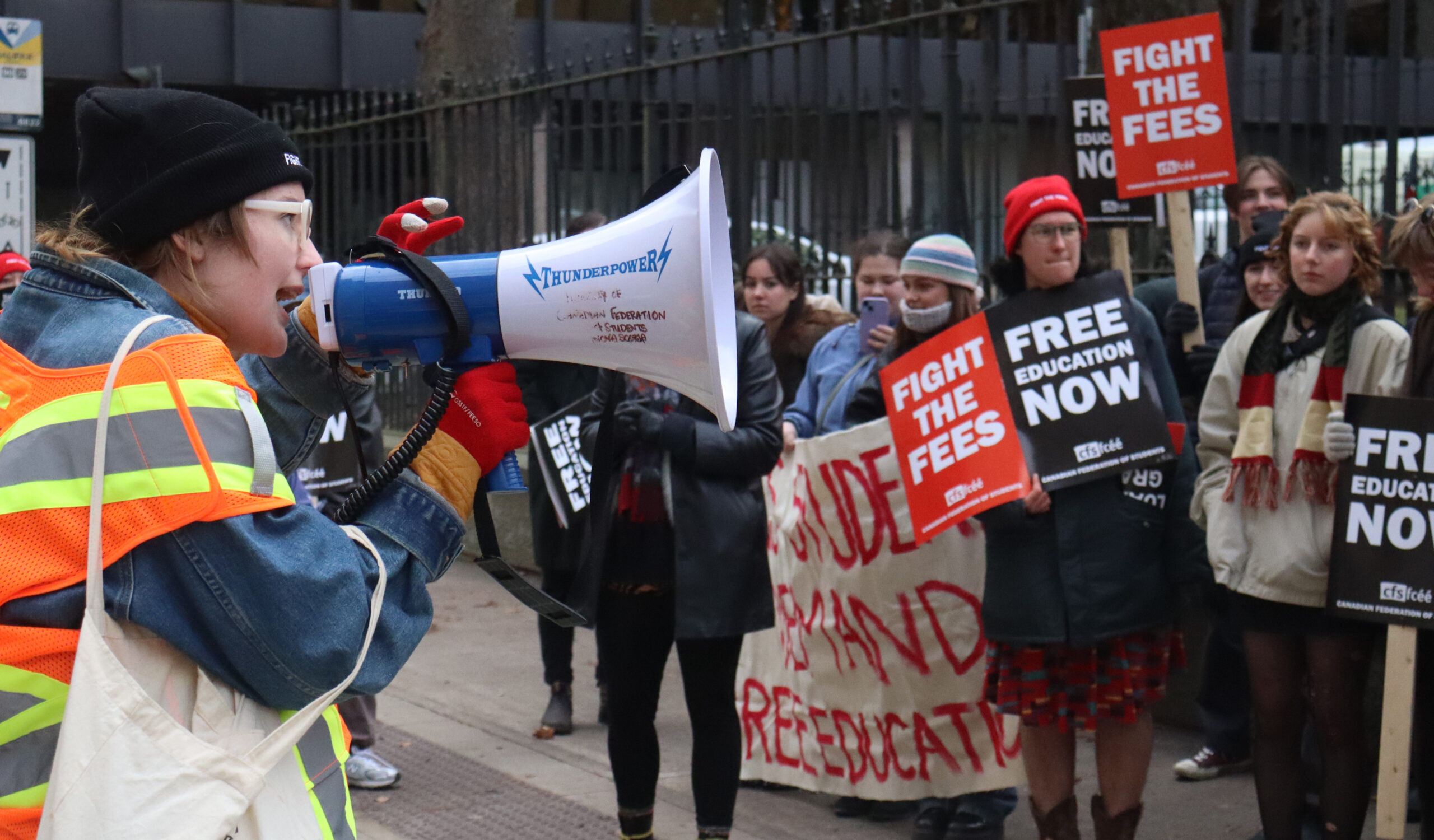Nova Scotia students join nationwide protest of tuition increases
Student group demands fair access to education

caption
Aideen Reynolds, CFS-NS chairperson, organized the protest in Halifax that happened on Wednesday.A small crowd of university students protested soaring tuition fees in Halifax’s Grand Parade on Wednesday.
The Canadian Federation of Students (CFS) organized a nationwide protest, known as the Day of Action, the first protest at the national level since 2016.
The purpose was to demand free, equitable education and fairness for international students.
Aideen Reynolds, chairperson of the Nova Scotia chapter of CFS, organized the protest of about 40-50 people at Grand Parade. The group informed tenters living there prior to the protest and gave them breakfast.

caption
Nova Scotia students march toward Province House to voice their demands for free education in Halifax on Wednesday, Nov. 8.Reynolds, who uses the pronouns they/them, said most jobs today require a post-secondary education, which was not always the case.
“When we’re forcing people to have a level of education in order to get a stable job, we have to make sure that that access is equitable for everyone.”
Nova Scotia has the highest domestic tuition of all provinces. Universities, including Dalhousie, have for years increased tuition to the three per cent maximum allowed by the province.
In 2022-2023, the average tuition for an undergraduate student in Nova Scotia was $9,328. That is $1,408 more than the average tuition in Ontario and $2,494 more than the national average.
Dalhousie and King’s raised international tuition fees in the past four years by 10 per cent each year.
“It is fundamentally and explicitly exploitative,” they said.

caption
University students demand free and fair access to education at Province House in Halifax on Wednesday.At the Grand Parade, Reynolds and others gave speeches before they marched to Province House to continue their protest.
One of them was Navy Nguyen, an international student at Cape Breton University (CBU).
Nguyen said CBU has acknowledged spending time and large sums of money on international recruiting and calls it “unethical and exploitative.”
International students are lied to by some recruiters and the explosive growth of students in Cape Breton has “triggered a housing crisis and job shortage for years,” Nguyen said.
Some students moved to Halifax for better employment and living accommodations, but still travel to Sydney for classes, Nguyen said.
Nguyen, who also uses they/them pronouns, mentioned an incident last December. A house fire killed one student and displaced seven others, highlighting the unsafe living conditions some students face.
“It shouldn’t have to be a privilege for me to be here, it should be a right,” they said. “Everyone should be able to access higher education for free, ’cause Canada can afford it.”
Tuition is of ‘serious concern’

caption
Peter Halpin, executive director of the Association of Atlantic Universities, says tuition fees in Atlantic Canada should be competitive with other universities in Canada.Peter Halpin, executive director of the Association of Atlantic Universities, acknowledges Nova Scotia has the highest tuition rates, which is of “serious concern” for university leaders.
Halpin also said that CFS “either inadvertently or deliberately” fails to mention that Nova Scotian students do not pay the full cost of tuition. They get a $1,283 bursary from the provincial government.
He also said universities in Nova Scotia generate between $100 and $150 million annually in student bursaries, scholarships and on-campus employment, which is designed to offset the cost of tuition.
When asked about the possibility of free education in Nova Scotia, he said “it’s an interesting idea,” but he wondered who would then pay for it.
“Does it have any realistic practicality associated with it? I don’t think so.”
Public universities get their funding from the provincial government and student tuition and funding from the government has been in a steady decline over the last 10 years, according to Halpin. Tuition fees rose to offset that loss in funding.
Demand for student services, such as mental health counselling and academic programming has gone up and costs a lot to sustain every year, said Halpin.
He said the association is in regular talks with the provincial government to address the rising tuition costs as it poses a “serious threat” to the competitiveness of Nova Scotian universities.
“You know, we compete for students right across the country and internationally,” he said. “So you have to be price sensitive.”
About the author
Dheif Daniel Yunting
A Filipino reporter now based in Halifax, N.S. Awarded as one of the outstanding interns at the newspaper outlet 'The Freeman' in 2021. Graduated...
